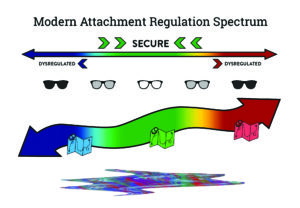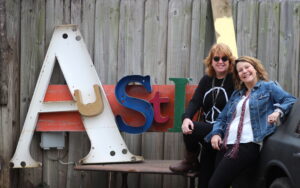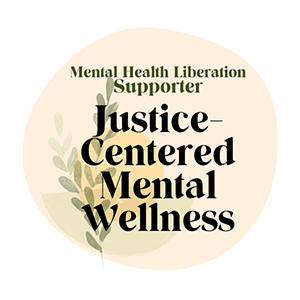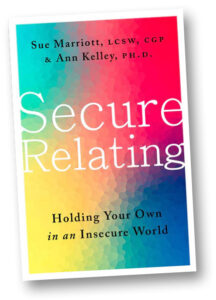Podcast: Play in new window | Download (Duration: 44:48 — 30.8MB)
Subscribe: Apple Podcasts | Spotify | Amazon Music
Attachment today
In today's episode, Sue Marriott and Ann Kelley provide an overview of the Modern Attachment – Regulation Spectrum – a model developed to integrate the varied attachment research, relational neuroscience, and the impact of culture & context. In this episode, they discuss what they call BAMA and the 3 R’s, which will come out in more detail in a book they've been working on for, well, quite awhile – so they just tell you the ideas here. 🙂 They also dig into attachment theory, internal working models, and states of being versus personality structure as they relay some of what they've learned in the past 5 seasons. It's a packed episode to summarize some of the 5 years this podcast has been produced.
personality structure as they relay some of what they've learned in the past 5 seasons. It's a packed episode to summarize some of the 5 years this podcast has been produced.
Note: This podcast is a labor of love, and our patrons keep us free of corporate ads – thank you. We don't sell anything except this course below on the attachment spectrum, which we created due to many requests. We aren't here for a profit, just to keep up with production costs so if you can't afford it, just contact us and tell us what you can pay. We want everyone to have access that wants it. And, we need to support production of the show, so thanks for any support, shares, reviews or what we'd really love – to also join as a patron.
Attachment Spectrum Course
Ok, Sue and Ann developed this a while back and need to update it. However, it is power-packed course that goes into much more detail than they could on the podcast – it's 4 hours! long. If you want to dive deeper into this topic, sign up by clicking below, and use OURCLAN as a discount promo code. For therapist, 3 CE hours are available.
You can't change your unconcious internal models unless you recognize them.
BAMA – Biology, Attachment, Maps, & Adult Attachment
BAMA refers to the developmental unfolding of what has been called attachment.
This represents the developmental unfolding of what eventually we call adult attachment.
Biology – we have a nervous nervous system that requires an older, wiser nervous system to help us feel safe. Polyvagal theory, affective co-regulation, mirror neurons and the 7 circuits of emotion are all online from birth, adjusting and responding to our environment.
Attachment- the first A refers specifically to infant attachment research. Think John Bowlby and Mary Ainsworth – or pre-dating them think of Konrad Lorenz and his geese, and Hary Harlow and his monkeys with their wire mothers which demonstrated we need more than milk, or food, to survive. We need a relationship. The Strange Situation was an original research instrument that validated Bowbly’s ideas and recognized the categories they later termed as Insecure-Avoidant, Secure, Insecure-Preoccupied and Disorganized Attachment.
Maps are formed when patterns are established based on repeated experiences of the child's biological drive for emotional safety. Neural wiring forms to effectively create safety from 6 months to 3 years, and behavioral strategies develop from this basic biology to keep the caregiver close and available. The key here is “available” – some parents are fine being close but should their infant appear distressed or upset with them, they defend, avoid and reject the “needy” baby. That, my friends, makes them emotionally unavailable, so the toddler learns quickly what to do and what not to do to keep the caregiver open and responsive. In this case that may mean repressing expressing negative emotions, pushing away needs, and doubling down on the value of self-reliance. This reduces the unconscious threat in the parent, thus keeping them as available as the toddler can make them. Notice though the whole drive is to create as much closeness as possible, and the internal working model, or map, helps navigate the way. These maps, also called internal working models, are the key to change. They set us on a trajectory of development that becomes self-reinforcing – if I see the world as unsafe I behave accordingly and thus make the world less safe which confirms my original hypothesis. Or, I see the world as just fine but myself as unlovable and undeserving, thus I look for evidence supporting this worldview and unconsciously co-create the very experience I most fear. Rejection and abandonment closely follow because while we think we are seeking closeness, our grabbing and not allowing ourselves to be soothed actually causes us to eventually be rejected, the exact thing we unconsciously predict is going to happen anyway.
Adult Attachment, Finally the last A in BAMA. This represents us, now. We are all grown up on one hand, but we carry forward our shaped nervous system, behavioral strategies, and unconscious maps to navigate the relational world. We love, fight, bond, mate, and parent from the trajectory of the BAM in BAMA – Biology, Attachment and then Maps, or attachment representations.
You need to go through the “Oh God” to get to the realization.
The 3 R’s of healing attachment
This is one of many versions of the overall path to healing and recovery. It names stages but doesn’t identify specifically how to’s just yet. Instead, this is the basic scaffolding that is recognized in many models including Fonagy, Elliott & Brown, Siegel, and addiction research – pre-contemplation, contemplation, and change.
- Recognize – you can’t even begin to relate securely until you value current and historically emotional relating. If the problem is just your partner, you haven’t begun the journey. Get curious, reflect – we notoriously over-index on the other being a problem and under-index on how difficult we are and how distorted and self-serving our perceptions can be. Once we begin to recognize that our early experience may be shaping how we relate today, then we can get started. Recognition is global – in general, do you find value in being curious and reflective about human connection? It is also individualistic – can you get curious about how you affect others. How other's reactions play into the next response. How you recoil at someone crying… what’s THAT about? Or how you have trouble noticing what she’s done for you and only mark how she’s missed you. Once we can begin to value this exploration and begin to see that there are larger forces at play than our small left-brain conscious rational minds… only then can we proceed to incorporate the second R.
- Re-examine – now that we are on to ourselves, not always trusting other's perceptions over our own, or realizing we don’t trust anyone but ourselves, then we have hope for change.
- Rewire – This is not a metaphor, you can literally use your new thinking to change your experience. You can update your mind, which changes your brain, which then changes your relational experience and perception.
What's something that you know isn't true, is inhereted from your history, but you can't quite let it go? More importantly, what is true that you want to replace it with? OK, let's get busy doing just that!
In this episode:
 Discussing the overall podcast, tying everything together.
Discussing the overall podcast, tying everything together.
The Modern Attachment Regulation Spectrum
Explaining the 3 Rs.
Explaining BAMA
Understanding how attachment has evolved.
Why a continuum
Internal working models
The various color stages for the internal working model of attachment. (Blue, Red, Green, Yellow)
Tye-Dye, a mention of unregulated stress, and why we need to organize.
Don't forget to join our Facebook Group, if you'd like to continue this conversation with other people!
Want more on modern attachment? Not sure you need it if you heard this episode but here are other one's like it!
TU126 – What Do We Mean by Modern Attachment? Sue Marriott & Ann Kelley Discuss
TU79: Attachment Spectrum and the Nervous System, Quick Review with Updates
Pre-orders are officially available! Get it now to join in the fun when it arrives April, 2024.

Please consider giving to Mental Health Liberation
We support mental health access to those traditionally left out of mainstream healthcare and use a portion of the income we receive from corporate sponsors to do just that! We can only do that with the help of our Patrons – joining as a TU Neuronerd Podsquad premium subscriber, you support this mission and get a dedicated ad-free feed plus occasional very cool and unique study opportunities, reading groups, and unique surprises! We invite you to join our community. Click here to join!
Mental Health Liberation is our primary partner at this time – please consider giving whatever you can to support mental health access for those traditionally left behind and support training for BIPOC therapists.














